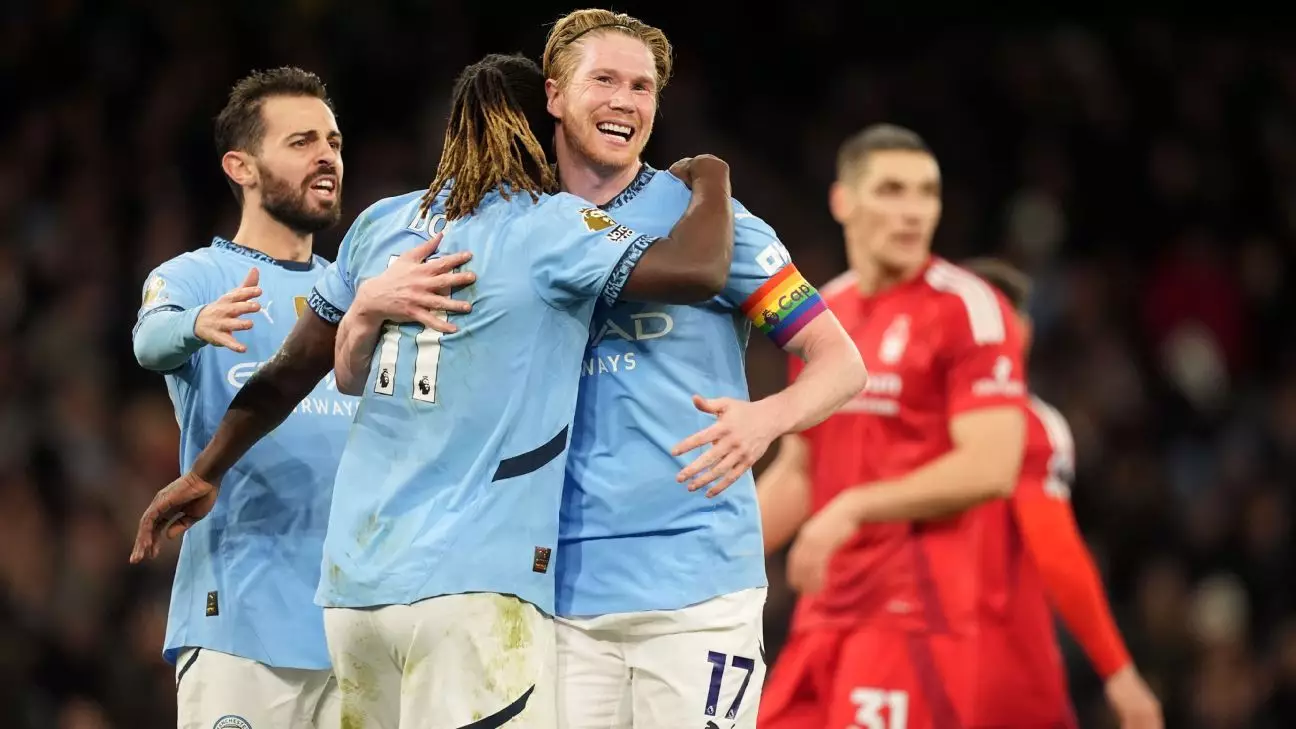Manchester City secured a critical 3-0 victory over Nottingham Forest at the Etihad Stadium, signaling a potential turning point for the defending champions. Yet, while Kevin De Bruyne’s presence on the pitch undeniably contributed to the triumph, manager Pep Guardiola was quick to emphasize that the 32-year-old midfielder is not a panacea for all of the team’s troubles.
Making his first start since sustaining an abdominal injury in mid-September, De Bruyne showcased his impact nearly instantly, finding the net and providing an assist within the opening half hour of the match. It was a testament to his skill and importance — even if his return doesn’t magically resolve City’s myriad problems. As the match progressed, De Bruyne’s influence became apparent, helping his team break a troubling streak of six defeats and a draw. They had not tasted victory since their win against Southampton on October 26, making this win not just a numerical mark in their season but a necessary boost to morale.
Despite being 34 in the upcoming summer and riddled with injuries over the last year and a half, De Bruyne remains an essential player for City. Guardiola expressed his joy at De Bruyne’s return, indicating that his experience and quality are needed by the club, especially after such a tumultuous sequence. This match served as a hopeful sign for both De Bruyne and Manchester City, as Guardiola indicated the significant effort and mental fortitude De Bruyne displayed to return to the field.
Rebuilding Team Dynamics
De Bruyne’s comeback is not solely about individual contributions; it also plays a crucial role in rebuilding the chemistry within the team. Although Guardiola downplayed any personal disagreements with De Bruyne following his limited role in the recent defeat to Liverpool, the tactician is conscious of the need for cautious reintegration after an extended period off the field.
During the match against Forest, De Bruyne’s early contributions highlighted his central role in City’s setup, especially in providing support to other attacking players like Bernardo Silva and Erling Haaland. The challenge for City moving forward will be to capitalize on De Bruyne’s abilities without over-relying on him, something they have struggled with in recent outings. Silva’s goal marked his first since the season’s opening match against Manchester United, highlighting the necessity for more players to step up and share the goal-scoring responsibilities.
While the scoreline painted a picture of dominance, the match also revealed ongoing vulnerabilities that have plagued City throughout their recent disappointing run. Nottingham Forest managed a notable 12 shots, implying their potential to have scored at least once. Chris Wood’s squandered opportunity to level the game serves as a glaring reminder of City’s defensive weaknesses.
Injuries to defenders like Manuel Akanji and Nathan Aké will inevitably contribute to Guardiola’s defensive headaches. Their absence not only hampers the squad’s depth but raises questions about whether the remaining defenders can hold their ground against stronger opposition. Guardiola himself acknowledged these issues, stating, “The problems continue with Manu and Nathan,” pointing to a broader situation that requires attention.
A Long Road Ahead
While De Bruyne’s return is uplifting, it should not overshadow the reality that Manchester City has yet to solve its defensive frailties and goal-scoring inconsistencies. Guardiola understands this dynamic; he knows the importance of De Bruyne but remains grounded in the challenges ahead.
As City looks ahead to challenging fixtures against Crystal Palace and Juventus, there is a mixed sense of urgency and optimism. De Bruyne’s performance has ignited hope, but the fragility of the squad highlights the necessity for sustained growth and improvement in the coming weeks. The narrative of the season remains uncertain; De Bruyne’s return may be a pivotal moment, but it is merely one piece of a larger puzzle.
Ultimately, while Kevin De Bruyne’s comeback certainly adds a layer of excitement, it’s clear that Manchester City as a collective must navigate the murky waters of injury struggles and tactical inconsistencies to reclaim their status as one of Europe’s elite teams.

Leave a Reply